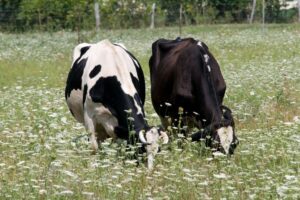
Ken BanksNorth east Scotland reporter, Aberfeldy
BBC
Ian Duncan Millar lost dozens of his sheep to the virus on his farm
When Ian Duncan Millar found several sheep dead on his Perthshire farm, he immediately suspected a virus was to blame.
The next day, more had died, and he ended up losing more than 70 of his flock near Aberfeldy in the space of just two weeks.
Tests confirmed tick-borne louping-ill virus (Liv) was to blame, a disease the National Farmers Union (NFU) Scotland describes as a “growing concern” for sheep farmers across the country.
A new vaccine has recently been developed by the Moredun research institute in Edinburgh and crowdfunding efforts are under way in at attempt to get it on to the market.
The Scottish government has agreed to match funds up to £100,000 of what is raised, after what have been described as successful experimental trials.
Sheep at Tirinie Farm in the Perthshire hills were struck down in 2023
Mr Millar has been farming for 50 years, and was awarded an MBE in 2010 for services to agriculture in Scotland.
His flock of the easy-care breed at Tirinie Farm was struck down in October 2023.
“I came up to the field and saw a dead sheep, and then another one,” he told BBC Scotland’s Landward programme.
“There were seven or eight. I am not used to seeing deaths. The next morning another five were dead.
“It had me really worried, what the heck was going on here, instant death. I suspected it was louping-ill.”
Tirinie Farm is near Aberfeldy
He called in a vet, and laboratory tests confirmed the virus.
Mr Millar described the scale of the deaths as “traumatic” and “devastating”.
He lost more than 70 of his 500-strong flock, and estimated the total financial loss would have been about £25,000.
“There were financial implications, it’s big figures, but the biggest worry for me is the sheep, it’s a welfare issue,” he explained.
“There’s more instances of the virus than at any stage in my lifetime.”
A previous vaccine was withdrawn from sale in 2017.
Mr Millar said a vaccine would have the advantage of not having to use pour-on chemicals in a bid to tackle ticks, reducing potential environmental implications.
“I cannot over-stress how important a vaccine is, how much better would it be,” Mr Millar said.
“A vaccine makes so much sense. It would be used, and be useful in the whole of the UK.
“We can use science for the benefit of farming.”
The UK market is not big enough to sustain a louping-ill vaccine, and the disease is not prevalent across the world. This means there is no route to commercialisation through the large pharmaceutical companies.
Moredun Research Institute is instead using crowdfunding in a bid to get its vaccine into the marketplace with a partner company and a figure of £720,000 is the initial target.
David Griffiths, lead scientist at Moredun, said it was important for farmers to have a readily-available vaccine.
Dr David Griffiths has been working on the vaccine at Moredun
“Once we have the money, it might take two to three years,” he said.
“We have done most of the hard work. We estimate we could sell 200,000 doses in the first year.
“It’s not necessarily about profit, it’s about solving a problem for farmers.
“They put their lives into farming, so louping-ill can be terribly distressing.”
What is louping-ill and why is it on the rise?
Louping-ill is a tick-borne virus disease which affects sheep in the UK.
The name comes from the Scottish word louping, meaning to jump, referring to the characteristic jumping or springing movements of infected animals.
Currently, no licensed vaccine is available for louping-ill, and the disease can cause devastating losses.
Since the withdrawal of the previous vaccine, and with tick populations increasing and spreading, cases of louping-ill have risen and expanded into new areas.
PA Media
Sheep in the UK are said to be facing an increasing risk due to the virus
NFU Scotland vice president Robert Neill described louping-ill as a growing challenge for Scottish sheep farmers, particularly in upland areas.
“As climate change drives tick populations into new regions, we are seeing an increase in this serious, sometimes fatal, disease,” he said.
Mr Neill said the loss of the previous vaccine left a “significant gap” in protection, and it was “hugely welcome” Moredun had been working on a new solution.
“An effective and affordable vaccine would help farmers protect animal health, reduce losses and adapt to the changing disease risk,” he said.
“Vaccines are essential tools for maintaining flock health and resilience, and NFU Scotland strongly supports efforts to ensure any new product is made commercially available to farmers.”
Rural Affairs Secretary Mairi Gougeon said the virus was a serious problem facing the country’s sheep farmers.
“This invaluable work by Moredun is an excellent example of the sector working together to find solutions to the challenges it faces,” she said.
“I hope our £100,000 match funding pledge amplifies the industry support to develop and bring this vital vaccine to market.”





